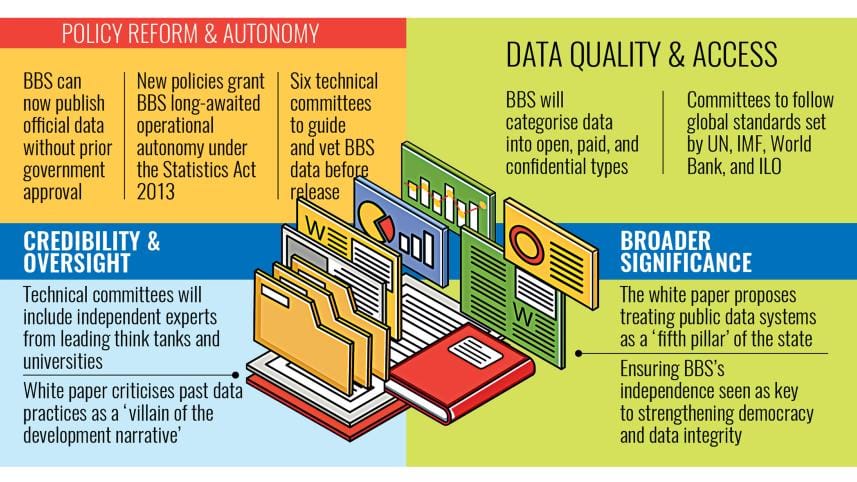BBS finally empowered to publish data independently

As part of policy reforms aimed at improving the credibility and accuracy of national statistics, the Bangladesh Bureau of Statistics (BBS) has been empowered to publish official data without prior government approval.
At present, approval from the planning minister and head of state is required before the BBS can publish data. This process causes significant delays in data publishing, as files often remain stuck in limbo before ultimately being approved.
As a result, data are published much later than expected. For example, data on inflation are supposed to be published by the BBS at the start of each month, but due to the complicated process, they were sometimes not even published halfway through a month.
Additionally, this process leaves room for independent economists and experts to cast doubt on the accuracy and reliability of government-published data for years.
These concerns were also voiced in the interim government's White Paper on the State of the Bangladesh Economy, which described the previous regime's practices of data manipulation as "the villain of the development narrative."
On Wednesday, the government published two separate policies on data dissemination and statistical reporting, empowering the BBS director general to release data—including that for key indicators like GDP and inflation—following consultation with newly formed technical committees under the policies.
Ashikur Rahman, principal economist of the Policy Research Institute (PRI) of Bangladesh, welcomed the move.
"It is a common issue to not get accurate data in a timely manner. Any reform or new policy that cuts down on unnecessary bureaucracy is a welcome development. I appreciate it," he said.
Beyond just cutting bureaucracy, both orthodox and non-orthodox indicators of development should be regularly published in annual reports,
he said.
"This would enable accurate and timely policymaking.
"I think the government and the Planning Commission must provide strong leadership in this regard," he concluded.
An official from the Statistics and Informatics Division told The Daily Star that these new policies grant BBS the autonomy it lacked despite the existence of the Statistics Act 2013, which intended to ensure timely and accurate data publication through expert oversight.
After that, the government only formulated a policy on how private organisations would publish data. However, no policy was introduced to ensure the accuracy of government data under the law.
Twelve years later, the policies have now been formulated as part of the interim government's effort to ensure accurate and timely data.
The government has also formed an eight-member expert taskforce to improve the transparency, reliability, and accessibility of BBS data.
The committee will set timelines for releasing various types of data and statistical reports, and the BBS will publish them accordingly.
Planning Adviser Wahiduddin Mahmud told journalists that while the BBS does not require government approval to publish data, it has to follow the guidance and vetting of the technical committees.
The white paper suggested that the BBS establish technical committees consisting of independent experts (data users and data assessors) and data producers (relevant BBS officials) to review methodology and approve the data generated by the BBS before its release.
Under the new policy, six technical committees will be established.
For instance, the national accounting technical committee—tasked with producing GDP and inflation figures—will include representatives from institutions such as the Bangladesh Institute of Development Studies, the economics departments of Dhaka University and North South University, the Centre for Policy Dialogue, Power and Participation Research Centre, Bangladesh Policy Research Institute, South Asian Network on Economic Modeling, Federation of Bangladesh Chambers of Commerce & Industries, Bangladesh Bank, and government agencies.
The other technical committees relate to agriculture, census, computing, demographic and health, and industry and labour-related data.
To ensure the quality of data, these committees will follow guidelines, definitions, and methodologies of globally reputed organisations such as the National Data Quality Assurance Framework, the United Nations Statistics Division, the International Labour Organization, the International Monetary Fund, and the World Bank.
Data collected from censuses, case studies, and pilot studies will be categorised into three types.
One type will be freely available and regularly published on the BBS website. The second type will be accessible for a fixed price. The final type will be classified as confidential, as its disclosure may harm national interests or personal security.
The white paper also recommended ensuring independence by fostering political and operational autonomy—particularly for the BBS and other public data-generating agencies—saying it was vital to enhancing data integrity in Bangladesh.
"Recognising public data and information systems as the fifth pillar of the state—alongside the legislative, judiciary, executive, and media—can significantly strengthen democracy," according to the white paper.




 For all latest news, follow The Daily Star's Google News channel.
For all latest news, follow The Daily Star's Google News channel.
Comments